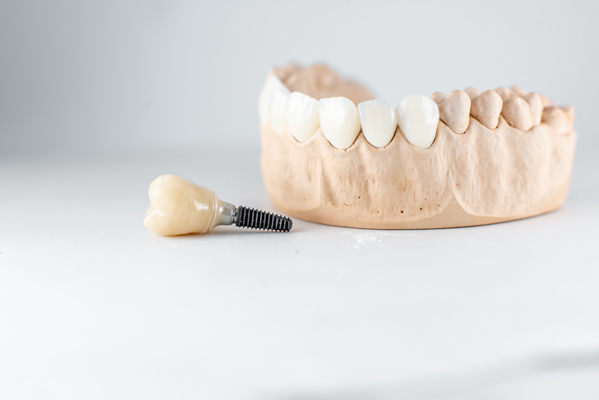Recovery Tips After Getting Dental Implants

The surgical procedure to place dental implants is similar to all others in that you need some time to recover from the operation. Implants require incisions, so the soft tissues will need to heal to seal up the wounds. In addition, the hard tissues of the jaw bone will also heal slowly, fusing the metal rod implant rod in place. Some pain and discomfort are expected after a procedure like this, at least for a couple of weeks, and complete recovery will take even longer. Fortunately, there are things you can do to control this and help your healing progress more quickly.
What factors affect healing from dental implants?
The time to recover from the procedure can vary depending on the health of the jawbone, the number of implants you are getting, and whether you had to have any teeth extracted first. Note that recovering from dental implants involves more than just healing the gums and managing the pain. Before the implant can support a tooth prosthesis, it has to go through a process of osseointegration in which it becomes permanently bonded to the jawbone.
Healthy habits can speed up the recovery process, but harmful ones can inhibit healing. Do not smoke and limit alcohol use. In fact, some dental experts may recommend avoiding alcohol consumption altogether until the soft tissues are fully healed. In addition, intense or rigorous exercise is not recommended for the first few days after surgery. This can increase blood flow at the incision site and lead to excess bleeding.
What are some tips for managing discomfort during your recovery?
Osseointegration is a process that takes several months. Fortunately, recovery from postsurgical discomfort is much faster, typically resolving completely within the first week or two. Here are some things you can do to improve symptoms during this initial period.
Perform salt water rinses
Take 8 ounces of warm water, add one teaspoon of salt and stir until the salt dissolves. Swish the salt water gently around in your mouth for about 30 seconds, then spit. This can be performed up to four times a day, but your dentist may make a more specific recommendation. Warm salt water is soothing to your surgical wounds and also helps to kill bacteria that could cause a postsurgical infection.
Use ice packs
It is normal for you to experience facial swelling after the implantation procedure, but it can be uncomfortable. Using an ice pack on your face helps to reduce the swelling by causing blood vessels to constrict, decreasing blood flow. It also helps to numb the pain. Be careful to wrap the ice pack in a towel before applying and do not leave it on too long, or you could damage the skin. The ice pack can stay on for 20 minutes, then stay off for 20 minutes, alternating in a cycle as needed.
Stay hydrated and eat soft foods
Dehydration can make you sick, but proper hydration also has a role to play in the recovery process. It increases your energy and flushes out toxins that are counterproductive to healing. Drink plenty of water and avoid alcohol and caffeinated beverages. These can act as diuretics and leach fluids from your body.
Maintaining proper nutrition after surgery is necessary for your recovery, but you need to give your jaw a rest to promote healing. For the first few days, eat only soft foods that require little or no chewing, gradually progressing to harder foods according to your dentist's instructions. Do not drink through a straw or you could disturb the blood clot that is protecting your surgical site as you heal.
Watch out for warning signs
Pain, swelling, and bleeding are all normal side effects of dental implant surgery. However, if any of these symptoms do not improve or start to worsen over the next few days, call your dentist right away. These issues could also be a sign of an infection. While they are not very common with this type of procedure, infections can be dangerous and may even lead to implant failure without the right treatment.
Conclusion
Unless there are complications, which are rare, postsurgical discomfort from dental implants should resolve within the first two weeks following the procedure. However, the osseointegration portion of recovery takes several months. It is important to follow your dentist's recommendations for at-home care as the weeks and months pass until the surgical site has mended completely.
Request an appointment here: https://www.stluciedentist.com or call St Lucie Center for Cosmetic Dentistry at (772) 242-4124 for an appointment in our Port St. Lucie office.
Check out what others are saying about our dental services on Yelp: Dental Implants in Port St. Lucie, FL.
Related Posts
Though implant crowns and traditional dental crowns look almost identical, they serve different purposes. Implant crowns are key to tooth replacement involving dental implants, while traditional ones primarily reinforce and repair natural teeth. Understanding the differences between these options can help patients make informed decisions regarding restoring their smile.Implant crowns are attached to a dental…
Transform Your Smile: Complete Guide to Dental Implant Surgery & Smile Restoration ); ="pros"> Benefits: Permanent solution Looks and feels natural Preserves jawbone No special maintenance 95%+ success rate Considerations: Requires surgery Longer treatment time Higher initial cost Healing period needed Perfect for patients missing most or all teeth. This innovative technique uses just four…
Cost of Dental Implants and All-on-4 Near Me: Complete Guide for St. Lucie Residents /* WordPress Blog Styling */ .dental-implants-blog );
Individual Dental Implants vs. Full Mouth Restorations: Choosing the Right Solution /* Custom CSS for Dental Implant Comparison Blog Post */ .implant-comparison-blog TLDR: Individual dental implants replace single teeth one-by-one, while full mouth restorations like All-on-4 and All-on-6 replace entire arches with fewer implants. Your choice depends on how many teeth you're missing, your budget,…




